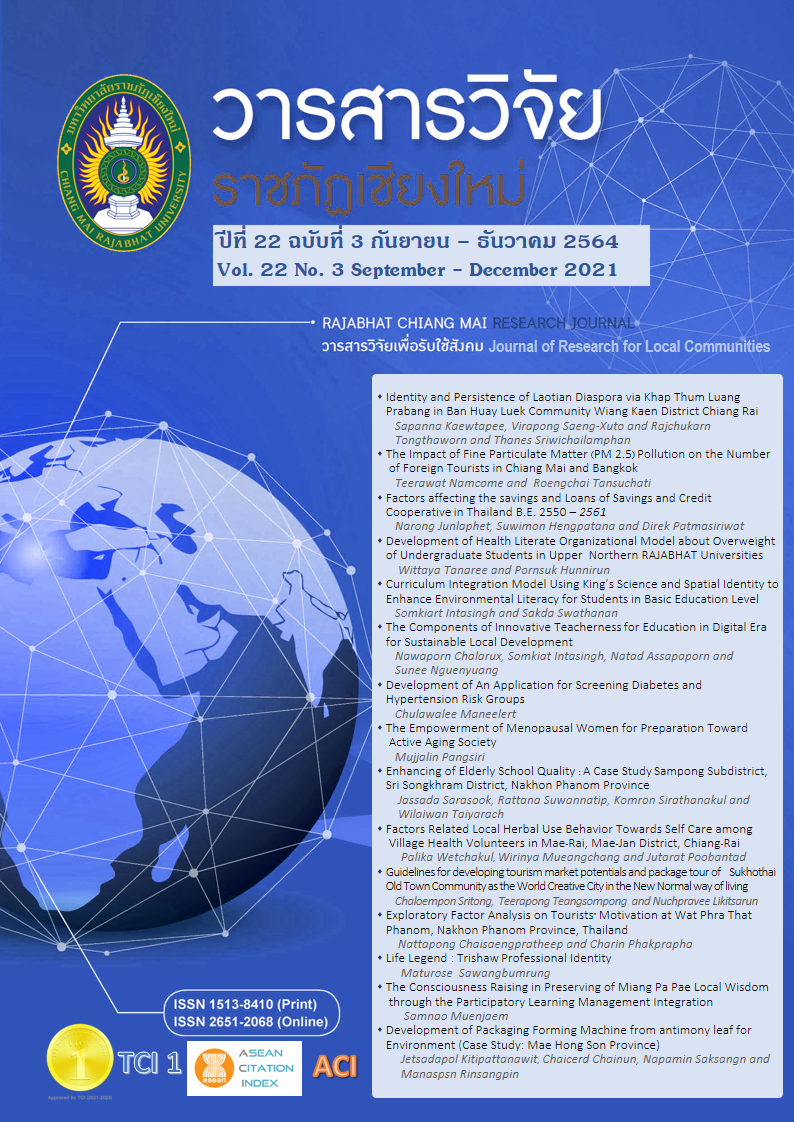The Components of Innovative Teacherness for Education in Digital Era for Sustainable Local Development
DOI:
https://doi.org/10.14456/rcmrj.2021.247707Keywords:
An innovative teacher, An innovative teacherness, Sustainable local developmentAbstract
Objective of this research were to synthesize and evaluate the components of innovative teacherness for education in digital era for sustainable local development. The research sources were 1) documents and related research papers and 2) interviewees were 5 instructors of the Bachelor of Education Program, Maehongson College, Chiang Mai Rajabhat University. The target group included 5 qualified experts in education and innovation by purposive sampling. The research instrument is documents synthesis form, in-depth Interview questionnaire, validity and suitability assessment form. Analyzing the data by analysis content and present the information through descriptive statistics for frequency distributions, Analyze quantitative data by finding mean and standard deviation.
The results of the research were as follows: 1) The components of innovative teacherness for education in digital era for sustainable local development are as follows: 1.1) There are 10 compositions of an innovative teacherness. 1.2) The components of innovative teacherness for education in digital era for sustainable local development are 5 areas, including 20 compositions. 2) The evaluation results of the validity and suitability of the component of characteristics of an innovative teacherness for education in digital era for sustainable local development. The overall the validity is at a most level, with mean 4.51 and the suitability is at a high level, with mean 4.49
Downloads
References
Chaemmchoy, S. (2018). School Management in Digital Era. Bangkok: Chulalongkorn University Press. (In Thai)
Dachakupt, P., & Khaengkhan, P. (2008). Teacher competencies and Guidelines for teacher development in dynamic society. Bangkok: Office of The Education Council. (In Thai)
Dyer, J., & Gregersen, H. (2011). The Innovator’s DNA: Mastering the Five Skills of Disruptive Innovators. Boston: Massachusetts.
Furr, N., & Dyer J. (2014). The Innovator's Method: Bringing the Lean Start-up into Your Organization. Boston: Massachusetts.
Kelley, T., & Littman, J. (2005). The ten faces of innovation. New York: Currency/Doubleday.
Landrum, G. N. (1991). The Innovation Personality – A Case Study on Thirteen Innovative Visionaries Based on Key Characteristics of Their Personal Behavior. (Doctor of Philosophy, Dissertation, Walden University).
Meesuwan, W. (2017). Factors Contributing to Characteristics of Teacher Innovations in Education Technology in Professional Pre-Service Teacher School of Naresuan University Network. Journal of Education Naresuan
University, 19(3), 50-62. https://so06.tci-thaijo.org/index.php/edujournal_nu/article/view/100890 (In Thai)
Ministry of Education. (2017). 4 Quality Education. Bangkok: Prikwan graphic. (In Thai)
Panich, V. (2013). Teachers for students: Flip Your Classroom. (2th ed.). Bangkok: S.R. Printing. (In Thai)
Phuaphromyod, P. (2019). NIA promotes innovative skills in “EDUCA 2019” to develop teachers to students. Retrieved from https://mgronline.com/smes/detail/9620000106421. (In Thai)
Rogers, E. M. (1983). Diffusion of innovation. (4rd ed.). New York: Free Press.
Sutthawart, W. (2015). Development of Program for Reinforcing The Educational Innovator Potentiality. (Ph.D., Silpakorn University). (In Thai)
Sutthawart, W., & Chuntuk, T. (2016). Educational Innovator’s Potential Development Method. Veridian E-Journal, Silpakorn University, 9(1), 748-767. https://he02.tci-thaijo.org/index.php/Veridian-E-Journal/article/view/61532 (In Thai)
Sutthawart, W., & Siriwong, P. (2015). The Basic Educational Inonvator in Public Sector: A Study for Grounded Theory. Veridian E-Journal, Silpakorn University, 8(2), 281-300. https://he02.tci-thaijo.org/index.php/Veridian-E-Journal/article/view/40205 (In Thai)
Wagner, T. (2010). The Global Achievement Gap: Why Even Our Best Schools Don't Teach the New Survival Skills Our Children Need-And What We Can Do About It. Basic Book: New York.
Wilachai, A., Dokmai, P., & Worakham,.P. (2020). Development of Life-Long Learning Skills for grade 10 students by Mobile – Learning (m – Learning). Rajabhat Chiang Mai Research Journal, 21(2), 20-34. https://so05.tci-thaijo.org/index.php/cmruresearch/article/view/235689 (In Thai)
Yoddumnern, T., Pluemsamran, T., & Mahaketa, A. (2020). Development of athletics Instructor training course of Rajabhat University. Rajabhat Chiang Mai Research Journal, 21(2), 96-111. https://so05.tci-thaijo.org/index.php/cmruresearch/article/view/238357 (In Thai)
Youngsuksathaporn, P. (2012). Innovation; Real Thinking Can Do. Bangkok: The Intellectual Property Association of Thailand. (In Thai)
Downloads
Published
How to Cite
Issue
Section
License
1. Articles, information, content, images, etc published in the “Community and Social Development Journal” are copyrighted by the Community and Social Development Journal, Chiang Mai Rajabhat University. In order to properly distribute the articles through print and electronic media, the authors still hold the copyright for the published articles under the Creative Commons Attribution (CC BY) license, which allows the re-distribution of the articles in other sources. References must be made to the articles in the journal. The authors are responsible for requesting permission to reproduce copyrighted content from other sources.
2. The content of the articles appearing in the journal is the direct responsibility of the article authors. The editorial board of the journal does not necessarily agree with or share any responsibility.














